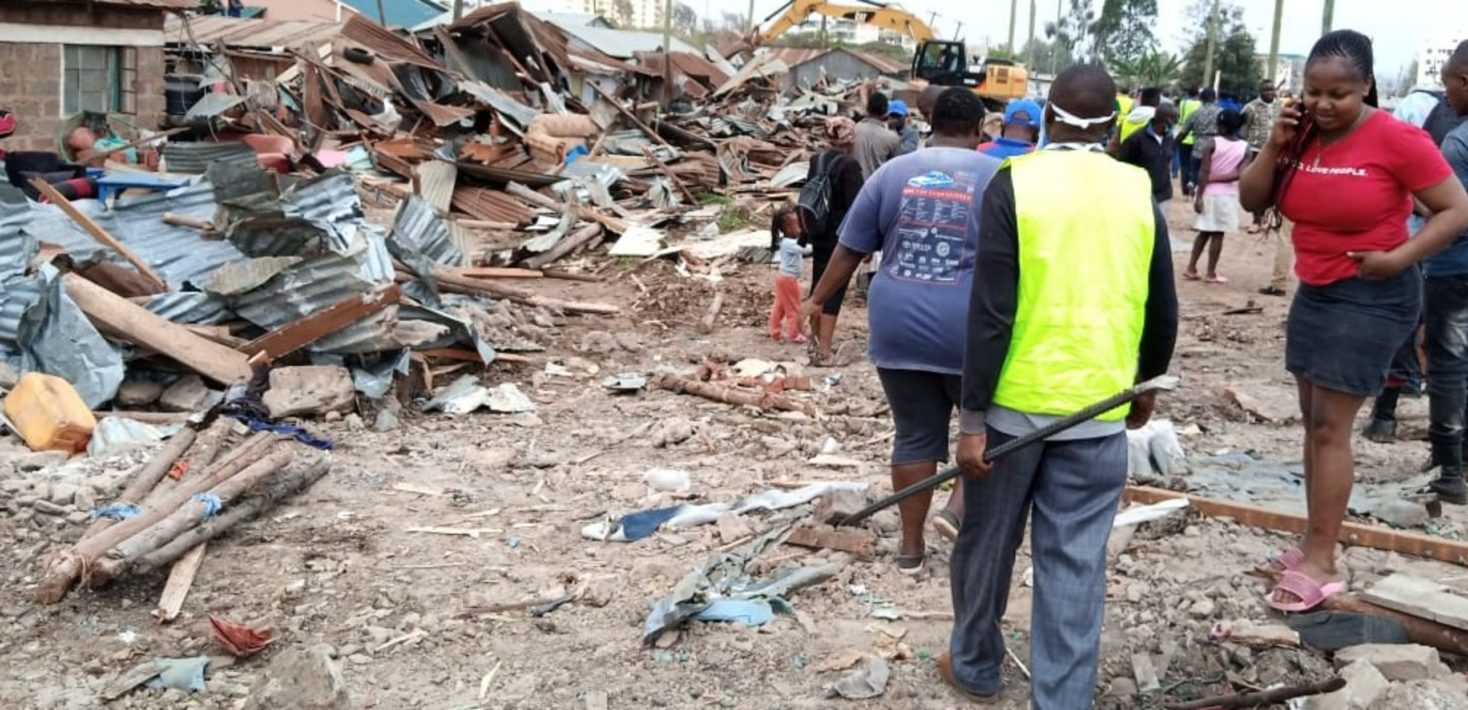As organisations that are deeply engaged with communities residing in Nairobi’s most vulnerable settlements, we express grave concern about the repercussions of the government’s ongoing evictions in informal settlements along the river corridors in Nairobi. These evictions only exacerbate the challenges faced by vulnerable communities already grappling with the severe aftermath of recent torrential rains.
The recent Cabinet Directive on 30th April 2024, and subsequent Public Security Orders on 2nd and 4th May 2024, have mandated the ‘voluntary evacuation’ or ‘forcible relocation’ of individuals occupying riparian zones. These directives are anticipated to result in the permanent displacement of over 127,000 vulnerable residents in Nairobi alone. However, it is concerning that at the time of these announcements, no viable Relocation Action Plan had been established, the enumeration of affected individuals had not commenced, and there was a lack of clarity regarding any compensation scheme.
On Thursday, May 9th, 2024, a Community Town Hall Meeting took place at the Ruben Centre in Mukuru kwa Reuben, Nairobi. The gathering drew over 500 residents from various settlements, including Mathare, Kawangware, Kibra, and Mukuru, to discuss the government directives. Attendees expressed frustration regarding ongoing evictions, which contradicted the previous assurances from the government. Their sentiments underscored the community’s strong stance on the principles of transparency, fairness, and respect for the rights of those affected. Find below a summary of their statements:
- Rights of Slum Dwellers: The community insists on a fair, humane and well-researched eviction plan.
“Mama alipigwa rirasi juu ya kuuliza swali.”
“Wanatwambia hakuna kubomolewa lakini kwetu kuna maiti juu ya kubomolewa.” “Unanibomolea kwa maji ya floods, unanipeleka nje kwa mvua kwa nini?”
“Hatupendi kejeli, gava leta utu kwa wananchi!”
“Sisi ndio wenye solutions za challenges zetu, tukuwe involved kwa process.”
- Selective Enforcement: There is a perception of discrimination in the enforcement of evictions, with slum areas being targeted while affluent areas and businesses along the rivers remain untouched.
“Ni kama hii ubomoaji inalenga tu vijiji. Kuna nyumba wamejenga karibu na mto huku Kibera, hizo zitabomolewa?”
“Huko kwa viwanda, matajiri wamejenga ukuta yenye inasukuma maji kwa vijiji.” “Mbona hii bomoa bomoa iko na ubaguzi? Kwani tractor ni mbili tu hii Nairobi ya kubomoa vijiji zetu pekee? Kuna mahoteli kubwa kubwa kando ya mto enye watu wanaenda na boat. Mbona hio haijaguzwa?”
- Eviction Procedures: The community demands clear steps for eviction, including proper mapping, enumeration within the affected area, verification of data, proper resettlement plan and adequate notice periods (1-3 months, not 48 hours).
“Jana tractor ilikuja. Mama aliyekuwa amejifungua akawaomba waache atoke polepole but tractor ikakanyanga nyumba yake.”
- Government’s Compensation: The government’s offer of 10,000 KShs. is deemed inadequate for the evicted individuals, many of whom are in low-income jobs. Data from surveys shows that the majority of the people residing in those areas facing evictions work in small jobs that barely sustain them.
“Sio kupenda kwetu kukaa karibu na mto. Wengi wetu ni mama mboga na watu wa bodaboda na mapato yetu ni ya chini. Hatuwezi afford nyumba huko juu.”
As Civil Society Organizations working closely with the affected communities, we advocate for the following recommendations:
- We propose the development of a robust and community-centred Relocation Action Plan (RAP) that is rooted in inclusivity, transparency, and accountability – principles that are particularly crucial in times of emergency. This RAP should prioritise safeguarding lives, properties, and livelihoods, while also allowing for processes of negotiation and compromise. Central to the RAP’s efficacy is the urgent implementation of a rapid enumeration process, and ensuring affected communities receive timely and precise information. This includes comprehensive details on relocation options, logistical guidance on transportation, available support services at the new locations, anticipated duration of stay, designated points of contact, and next steps. The RAP should not only account for the 0 – 30 m riparian zone – for those that have been already affected, as well as those to be affected by the government directives – but also those to be affected by the additional 30 – 60 m planning corridor.
- We call for the deployment of immediate emergency assistance in the form of cash transfers to each affected household. We recommend that each household receive KShs. 30,000.00 per month for the three (3) months of May, June & July 2024, as well as any other in-kind support and donations required to ensure safety and security.
- We advocate for urgently verifying, validating, and integrating existing data concerning affected households into the State Department for Housing and Urban Development’s (SDHUD) Affordable Housing Programme (AHP). Furthermore, we recommend the designation of these households as ‘first-in-line’ and priority beneficiaries, for the allocation of social housing.
- We acknowledge the recurring loss of life, property, and livelihoods caused by the flooding of riparian zones, is often facilitated by unscrupulous government officials allowing and facilitating the occupation of these areas. We urge relevant government agencies, non-state actors, and the public to remain vigilant to prevent future occurrences and also hold the duty bearers accountable for any unauthorised occupation in riparian zones under their jurisdiction.
- Finally, we unequivocally demand accountability and justice for the lives lost, properties destroyed, and livelihoods disrupted during the forced evictions. Moreover, we strongly advocate for the government to implement humane interventions in their disaster management processes, during times of crisis such as these.
Yours sincerely,
Akiba Mashinani Trust,
Slum Dwellers International – Kenya,
Kounkuey Design Initiative,
Public Space Network,
The GoDown Arts Centre,
Amnesty International Kenya,
Habitat for Humanity Kenya,
Women in Real Estate (WIRE Kenya),
Ruben Centre,
Muungano Wa Wanavijiji,
Ghetto Foundation.


